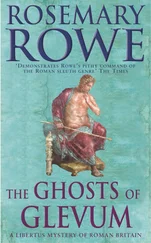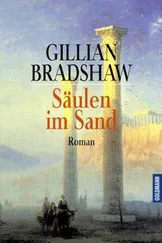Gillian Bradshaw - Island of Ghosts
Здесь есть возможность читать онлайн «Gillian Bradshaw - Island of Ghosts» весь текст электронной книги совершенно бесплатно (целиком полную версию без сокращений). В некоторых случаях можно слушать аудио, скачать через торрент в формате fb2 и присутствует краткое содержание. Жанр: Исторические приключения, на английском языке. Описание произведения, (предисловие) а так же отзывы посетителей доступны на портале библиотеки ЛибКат.
- Название:Island of Ghosts
- Автор:
- Жанр:
- Год:неизвестен
- ISBN:нет данных
- Рейтинг книги:3 / 5. Голосов: 1
-
Избранное:Добавить в избранное
- Отзывы:
-
Ваша оценка:
- 60
- 1
- 2
- 3
- 4
- 5
Island of Ghosts: краткое содержание, описание и аннотация
Предлагаем к чтению аннотацию, описание, краткое содержание или предисловие (зависит от того, что написал сам автор книги «Island of Ghosts»). Если вы не нашли необходимую информацию о книге — напишите в комментариях, мы постараемся отыскать её.
Island of Ghosts — читать онлайн бесплатно полную книгу (весь текст) целиком
Ниже представлен текст книги, разбитый по страницам. Система сохранения места последней прочитанной страницы, позволяет с удобством читать онлайн бесплатно книгу «Island of Ghosts», без необходимости каждый раз заново искать на чём Вы остановились. Поставьте закладку, и сможете в любой момент перейти на страницу, на которой закончили чтение.
Интервал:
Закладка:
“Death in battle is better than drowning,” Gatalas declared, rubbing the hilt of his dagger. “But I’d prefer it if I had something more than this and a rope to fight with. Do you think we could get our weapons back?”
“Probably,” said Arshak, almost eagerly. “My men have managed to keep thirty bows, forty quivers of arrows, and sixty swords hidden in our wagons. How many do your troops have?”
“Fifty bows and twenty-seven swords,” Gatalas replied promptly. “But only thirty quivers of arrows.”
“Ariantes?”
“Fifty-nine bows, sixty quivers of arrows, and a dozen swords,” I said, reluctantly. “But they’re all well hidden, and it will take a little time to get them out. Facilis is suspicious. He’ll find some way to obstruct us. Either we won’t be allowed near our wagons, or we won’t be allowed near our men, or both.”
“Facilis won’t be in charge in Bononia,” Arshak answered confidently. “The camp will have its own commander. Bononia’s a big place; the commander will be an important man, a legate or a procurator. You must have noticed how even tribunes don’t like taking orders from centurions, however senior. It won’t take much to ensure that we’re sent off to the wagons with our men.” Arshak smiled again, then added vehemently, “Facilis is mine.”
I sighed. I was not sure what I felt when I looked at the sea, but it was not anger or fear. Perhaps it was hope. I’d had enough of the worlds I knew, Sarmatian and Roman both, and here we’d ridden to the world’s end and were climbing down to touch something huge and mysterious beyond it. Why should I stop, here in this Roman city? Why not go on? I remembered the time long before when I had journeyed east, hoping to reach the Jade Gate of the Silk Country. I had been called back, halfway there. I regretted that still. Why stop again now, just short of the ocean?
Of course, I was tired. Some things had happened in the Roman war that had left me stunned, and when the war ended, I felt like one of the dead. I had a leg wound, too, which had meant that I’d ridden the first seven hundred miles of the journey with my leg in a splint, dazed with pain, and I’d floated through them in a kind of dream. Sometimes I woke up with a start and stared at myself in astonishment, but mostly I rode, ate, made camp, and gave orders to my men, all as though I were trailing behind myself and watching.
“What if they’re telling the truth?” I asked. “What if there is an island?”
“Why should you believe them?” returned Arshak, swiftly and angrily. “Why should we trust them?”
“I don’t trust them,” I answered wearily. “But we swore oaths to the emperor, and we aren’t yet certain that he was lying. If we fight them now, we will all die. You want to kill Facilis-but if you have to pay for the pleasure with the blood of all your men, is it worth it? Even if we managed to win our weapons, even if we gave them such a battering that they locked themselves in their forts and us out, still we couldn’t get home, not through a thousand miles of land held by our enemies. And the emperor would look at what we’d done, and note that even when Sarmatian troops surrender in a peace settlement, they can still rebel and shed Roman blood. He’d have no use for Sarmatian troops ever again. What could our people give then, to buy peace?”
Arshak scowled. “He wanted to kill us all anyway. He has betrayed us and he will betray those at home, whatever we do.”
“Better to die on land than in the water,” agreed Gatalas. “At least on land the soul can fly free to the sun.”
“But what if there is an island? If there is an island, it would be we who first betrayed them.”
“An island in the ocean, beyond the limit of the world!” scoffed Arshak. “And what’s more, an invisible one! If Facilis told you that there was an island in the sky and that you must climb up a mountain and jump off to reach it-would you believe him, and jump?”
“I wouldn’t choose a path that would end with all my men dead without at least tossing a stone off the mountain and looking where it landed! And I am not sure that the Romans would invent a Roman province across the ocean, simply to trick us. Britain may well lie thirty miles from here.”
“I will not cross the ocean!” cried Gatalas. “I will die cleanly in this world, and so will my men!” He stretched his hand toward the sun. “On fire I swear it!”
We rode on for a moment with the oath ringing in our ears. There didn’t seem to be any point in continuing the argument.
But I couldn’t leave it. When we reached this camp, we would have to begin planning our mutiny-and the more I considered it, the less likely it seemed that the Romans had invented Britain to deceive us. I had five hundred men who depended upon me to do what was best for them. “If I went,” I said at last, reluctantly, “on my own, without you, without any of my own people-if I went to see if this island was there, and came back and reported to you that it was-what would you do then?”
Gatalas looked at me fearfully. “What if it’s not an earthly island?” he asked, in a low voice. “If it’s there, beyond the ocean, it might be… a place where the dead walk. What would you be like if you came back then?”
“You’d still know, then, from looking at me, that you should not cross. You’d be free to fight the Romans with a clear conscience.”
“I’m not sure we’d notice any difference if you came back as a ghost, Ariantes,” Arshak said, trying to lighten the air a little. I met his eyes, and he dropped his smile: the joke was too true to be funny.
“Someone should check what the truth is before we take up arms,” I said.
“And if they refuse to let you go and come back again?” Arshak demanded.
“Then, again, we’ll know that they’re lying and we need have no doubts about fighting them.”
“Very well, very well,” Arshak said quietly. “Very well. You’re right: we must toss our stone off the mountain and see where it falls. A pity: my hands ache for a spear every time I see Facilis, and I will regret it as long as I live if he goes home to Aquincum unharmed.” After a moment he added, “And you’re willing to go? Because I’m not. It would mean swallowing what I said to Facilis.”
“I am willing to go,” I said. “I’ll tell Facilis as much this evening. Can I tell him that if we know he’s acting in good faith, we will go on their ships?”
Gatalas flinched, but, after a moment, nodded. “I will not be the first to break an oath.”
“Nor will I,” said Arshak again, unhappily. “But we’ll see what we can arrange for the Romans if it happens that they’re lying.”
Arshak was quite right about at least one thing, however: the procurator of the naval base where we stopped that night did not want to take his orders from Flavius Facilis. He’d had letters about us, and when we arrived he came out to the gate to look at us. It was easy for us to guess who the figure standing on the battlement was: he was wearing the long crimson cloak and gilded armor, and when we got closer we could see he had the narrow purple stripe on his tunic, marking him as a member of the Roman equestrian order. Arshak galloped up to the gate, stopped his horse, saluted respectfully, greeted him as “Lord,” and asked him where we could put our wagons. By the time Facilis had cantered up and suggested that we be confined to barracks instead, the procurator had already granted us leave to arrange the wagons in the shipyard, and wouldn’t back down: an equestrian appointed by the emperor doesn’t change his arrangements because a centurion who struggled up through the ranks thinks he ought to. Facilis turned crimson and swore under his breath, but had to accept it. He followed us to the shipyard, where he told us that if we “tried anything,” he would see to it that our bodies were burned. He knew enough about us to be aware that this was a terrible threat-but luckily the men couldn’t understand it.
Читать дальшеИнтервал:
Закладка:
Похожие книги на «Island of Ghosts»
Представляем Вашему вниманию похожие книги на «Island of Ghosts» списком для выбора. Мы отобрали схожую по названию и смыслу литературу в надежде предоставить читателям больше вариантов отыскать новые, интересные, ещё непрочитанные произведения.
Обсуждение, отзывы о книге «Island of Ghosts» и просто собственные мнения читателей. Оставьте ваши комментарии, напишите, что Вы думаете о произведении, его смысле или главных героях. Укажите что конкретно понравилось, а что нет, и почему Вы так считаете.












